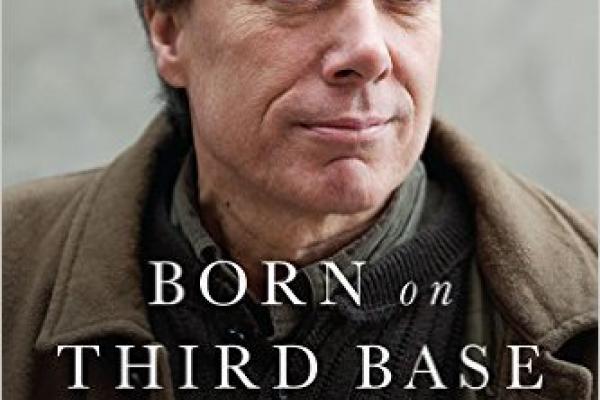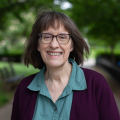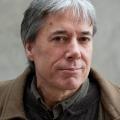WRITER AND ACTIVIST Chuck Collins, the great-grandson of meatpacker Oscar Mayer, gave up his inheritance when he was 26 and has spent the subsequent decades working to address economic inequality and environmental issues. Via email with Sojourners senior associate editor Julie Polter, he discussed his newest book, Born on Third Base: A One Percenter Makes the Case for Tackling Inequality, Bringing Wealth Home, and Committing to the Common Good (Chelsea Green)—and why organizing and building community across economic lines is good for everyone.
Sojourners: What is your main message in this book?
Chuck Collins: I want to invite wealthy and affluent people to “come home”—to return from wandering in the desert of wealth and privilege, the disconnection from community and place. It means putting a personal stake in reversing the deepening ruts of extreme wealth inequality and the ecological crisis. If we read the signs of the times, we understand this is both in our selfish interest as well as strengthening the common good. These inequalities and ecological challenges are undermining the quality of life for everyone, including wealthy people. There is no wealth on a degraded planet.
By reconnecting with people and places, we come out of exile. Racial and economic advantage is a “disconnection drug”—distancing us from both the suffering and the joy of being a human.
Many of the ultra-wealthy are “placeless” and “stateless”—literally holding multiple passports with money globalized in offshore financial centers around the world. So “coming home” means bringing the wealth home too—taking it out of the offshore tax havens, out of the global financial casino (“going off the Wall Street grid,” as one of the people I interview in Born on Third Base says), and out of the fossil fuel industry.
Whether you are ultra-rich or affluent, bringing the wealth home means redirecting capital to the life-enhancing sectors of the economy, the real economy of goods and services, the emerging new food and energy systems. It means sharing more generously, paying our fair share of taxes, and challenging the myths of deservedness that justify inequality.
Another message: Don’t give up on anyone. A lot of wealthy people are waiting to be called to something more meaningful than consumption. We must creatively invite them to the table of vibrant and faith-based movements to fix the future.
Why is it important for all of us to invest time and money in our local economies? We are heading into an economic and ecological transition. We all have a stake in building a local resilient and sustainable economy. This cannot be a “gated resilience” in enclaves, but a commitment to foster equality and racial justice through broadly owned enterprises and meeting more of our needs in local and regional spaces. We need to rebuild our mutual-aid muscles for the challenges ahead.
How does having the ultra-rich officially in control of much of our federal government refocus your work? Yes, it’s the opposite of “Occupy Wall Street”—it’s like the 1 percent, Wall Street, and Big Fossil Fuel just more deeply occupied the executive and most of the legislative branch. We have to engage in holding actions to stop some of the worst things from coming to pass. Anti-tax forces will try to abolish the estate tax, one of the few policies that interrupt dynastic wealth accumulation, along with other progressive taxes. We should resist these blatant efforts to shift the rules along with all the other policies that will attack the most vulnerable.
I’ve noticed a lot of wealthy people waking up in the aftermath of the Trump election, realizing we need to support organizing efforts in a number of arenas. Networks such as the Patriotic Millionaires are engaged in efforts to defend progressive taxes and press for higher wage policies and campaign finance reform.
We also need to press for state and local policy innovations to reduce inequality. A number of states are looking at ways to raise revenue and invest in broader opportunity. For example, states could tax inherited wealth above $2 million and dedicate it to debt-free higher education. Cities are now centers of discussion about using the tools they have to reduce inequality. The city of Portland, Ore., just passed an ordinance taxing corporations with excessive CEO pay at higher rates.
How can people of faith help change dominant narratives about wealth and privilege? One force that holds unsustainable inequalities in place are the stories of deservedness that justify some people having more than others. Some folks are not disturbed by statistics about inequality because “those people worked hard for that wealth,” or they say, “my wealth and advantage is the result of my own efforts—I didn’t get any help.”
These powerful stories have a grip on how we perceive ourselves in the world. But they fail to recognize the role of God’s grace and the “commonwealth” we build together that truly sustains us and is the foundation for most of the opportunities we have. If we are white, we sometimes forget the powerful advantages that flow our way. We think it’s all about us. Of course, individuals do matter—and the choices we make matter. But we would benefit from a more nuanced and more honest reckoning of what sustains us.
One thing we can all do is tell true stories—about the role of grace, luck, family help, public investments, and subsidies in our lives. We can disrupt and debunk the mythology of individual deservedness and white advantage—while celebrating individual choices, sacrifices, and gifts.

Got something to say about what you're reading? We value your feedback!


